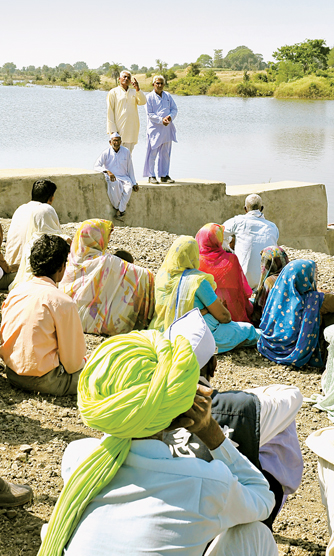ITC's Mission Sunehra Kal for Sustainable & Inclusive Growth
-
Management Approach - Society
ITC believes that the performance of business enterprises must be measured in terms of the value they create for society. Enterprises that embed sustainability in their business strategies can deliver substantial stakeholder value through innovative development models that simultaneously create livelihood opportunities and a positive environmental footprint. The Company firmly believes that such an approach unleashes strong drivers for achieving development with social equity.
-
Policy
The Board of the Company has approved a CSR Policy that covers the programmes, projects and activities that the Company plans to undertake to create a significant positive impact on its identified stakeholders. These programmes fall within the purview of Schedule VII of the provisions of Section 135 of the Companies Act, 2013 and the Companies (Corporate Social Responsibility Policy) Rules, 2014. The Policy was adopted in 2014-15 and continues in its original form since there have been no developments in the external or internal environment to prompt a review.
-
Commitments
Statement of Intent: ITC's Social Investments Programme (SIP) aims to transform the lives of even the most marginalised amongst its stakeholder groups to live a life of dignity. Our way of grass-roots empowerment, based on knowledge and technology transfer, confronts livelihood challenges of today and tomorrow through a holistic approach to create a prosperous, healthy, educated and skilled community which looks to the future with confidence and determination.
In order to actualise this intent, the Company is committed to ensure the following:
- Continue to strive for scale in the core operational geographies and remain contemporary by leveraging government partnerships and accessing knowledge / technical know-how.
- Strengthen and empower Community Based Organizations in all our project areas for participatory planning, ownership and long-term sustainability of interventions.
- Move beyond mere asset creation to behaviour change through focus on demand generation for all interventions to ensure ownership, participation and contribution.
- Specially target poor and marginalized communities/groups in our catchments to ensure inclusive development and thus impact human development indices significantly.
-
Goals & Targets
Context: In line with the Company's CSR Policy, the key stakeholders, based on the material aspects of our businesses, comprise:
- Rural communities with whom ITC's agri-businesses have forged long and enduring partnerships through crop development and procurement activities. While such economic linkages have generated wealth for rural households on a sustained basis for decades, they also look to the Company to help find viable solutions to combat extreme weather episodes that impose a threat to their production system.
- Communities residing in close proximity to our production units: Situated in urban and semi-rural hinterlands these communities derive considerable benefits from the multiplier effects arising from the operations. Nevertheless, there is an expectation that the Company will aid in creation of the necessary socio-economic infrastructure, thus contributing to human and social capital.
Core Operational Areas: Our commitment to transformational change in the lives of our stakeholders demands a very intensive and deep engagement. It was necessary therefore to rank all current locations of SIP's interventions in an order of priority to delineate those which are of prime importance to concerned businesses. Based on parameters relevant to businesses (given in the table below) and in consultation with them, core villages and clusters were identified during the year.
Based on these parameters, a total of 103 core clusters have been demarcated comprising 902 villages/wards which would form the nucleus of the 2 Horizons suite of interventions in the coming years and therefore require a significantly larger outlay of Social Investments.
Dominant Profile of Core Areas: In order to design a well-targeted programme, it was also necessary to identify some of the main demographic and agro-ecological characteristics of the core areas. Data for this was captured through household questionnaire surveys covering 1.16 lakh households, which formed 22% of the total households in the core areas.
The accompanying table provides a glimpse of some of the important indicators that would have a bearing on our work.
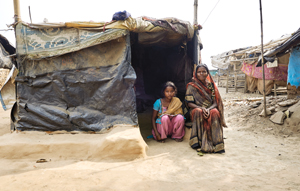
5 lakh households, 1/3rd Poor
5% women headed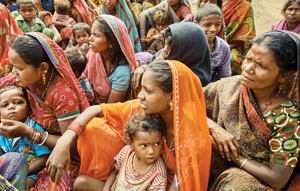
24 lakh population
23% SC/ST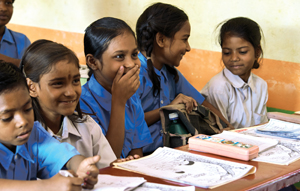
30% of population < 14 years
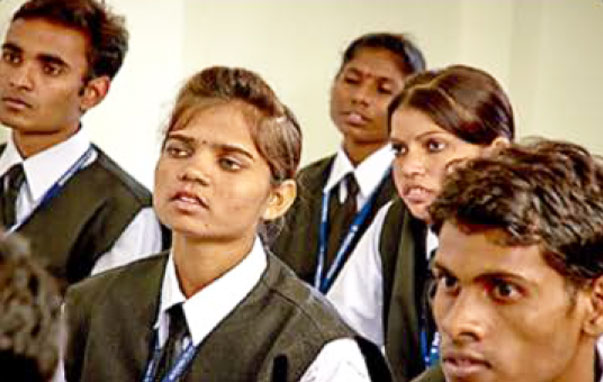
25% of population between 14-25 years of age
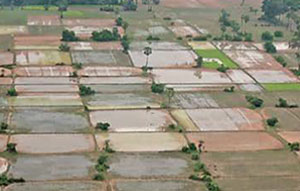
Fragmented landholding - 1 ha average size
60% small & marginal
Arable area - 2.13 lakh ha
60% rainfed agricultureInsights: The information from the needs assessments combined with the survey data of households provides important inputs into the nature of the development challenges faced by our stakeholder communities:
- Poverty remains a challenge in the core areas, and is endemic to both rural and urban populations. Data on stunted growth and infant and maternal mortality is a cause for concern in some states. Going forward there is urgent need to focus on the poor, the marginalised and women-headed.
- Farming remains the mainstay of nearly half of the households, which is dominated by small holder agriculture. Clearly, the focus of future interventions in rural areas must be to sustain smallholder dynamism through integrated farming systems to drive agricultural growth. It is equally important, in their context, to augment and sustainably manage common pool resources since poor rural households are crucially dependent on them to meet several subsistence needs, especially that of fuelwood and fodder.
- Like the rest of India, more than half of agriculture in our core area is rainfed. Since inception, ITC's Social Investments programme had identified development of water resources as a major priority area. Going forward, it is proposed to align watershed plans to geo-hydrological mapping of the project areas to ensure maximum aquifer recharge and work at a sub-basin revival to ensure year-round environmental flows.
- Off-farm opportunities are circumscribed in the project areas. Reduction in youth unemployment has also emerged as a priority to end extreme poverty and boost sustainable economic growth in India. ITC recognized the social risks of having large numbers of uneducated, unemployed and untrained youth, evident from the significant boost given to vocational training in 2014-15.
- One possible explanation for availability of low quality skills is the poor state of primary education in the country. ITC has always believed that universalization of primary education is vital for developing a productive and skilled workforce, evident from its large-scale education initiatives.
Two Horizons Approach: ITC's stakeholders are confronted with multiple, but inter-related, issues at the core of which are the twin challenges of securing sustainable livelihoods today and tomorrow for both rural and urban households, calling for a 2-horizon perspective:
Horizon 1: Making todays dominant source(s) of livelihoods sustainable; and
Horizon 2: Creating capabilities for wealth generation and employment for tomorrow.
This obviously calls for an integrated approach to development, comprising several layers of interventions that are summarised below:
Desired Outcomes - Adarsh Habitations: If such a holistic approach is followed, we will establish enabling conditions for the emergence of "Adarsh" habitations with indicators aligned to national priorities and goals, whether in the area of protection of natural resources or the development of human capabilities.
Indices benchmarked to the national MDG goals are given in the table below along with the range of baselines for each of the indicator. Quite obviously, the attainment of national benchmarks are long term goals with a 5-year time horizon.
-
Targets & Timelines
Based on the 2 Horizons strategy, a number of specific interventions have been put in place in order to achieve the desired goals. These are detailed in the table below along with the estimated time it would take to achieve these targets.
-
Responsibilities
Consultations on the annual plans take place at two levels: (1) Annually, with the relevant business managers where the projects are located. The objective is to get a business perspective on community issues faced by them and which they would like to be addressed; (2) Assessment of the problems and needs of the community through detailed Need Assessment surveys normally done once in five years for on-going projects or at the start of each new intervention / entry into a new location.
The two perspectives are then mapped to find a common ground and the Company's view is shared with the NGOs to ensure that both stakeholders develop and work towards a common set of goals and agenda. Annual plans are thereafter finalised in consultation with programme implementing agencies (NGOs) and the community based institutions, keeping the Company's focus areas, emerging needs of the catchment and funds available on the radar.
These plans are then aggregated and presented to the Management Committee of the Social Investments Programme which scrutinises the proposals and forwards it to the Corporate Management Committee for it approval during the annual business plan presentations. These proposals are then presented to the CSR/Sustainability Board Committee which tables for the Board's approval, the SIP Plan outlining the interventions to be carried out during the financial year and the specified budgets therein. The Board deliberates and approves the CSR Plan with modifications that may be deemed necessary. The Company's Corporate Management Committee (CMC) reviews the implementation of the SIP and issues necessary directions from time to time to ensure efficient and effective execution of SIP in accordance with this Policy. In addition, the CMC provides a status update to the CSR and Sustainability Committee on the progress in implementation of the approved CSR Programmes. The CSR and Sustainability Committee reviews such reports and keeps the Board apprised of the implementation status of the same.
-
Specific Actions
ITC's Social Investments Programmes accesses knowledge/technical know-how, leverages government partnerships and focuses on core operational geographies to promote all-inclusive development. The initiatives aim at creating "Adarsh" habitations aligned to national priorities and goals, both in the area of protection of natural resources and development of human capabilities.
Coverage
The projects promoted under the Social Investments Programme are spread over in 166 districts of 26 states.
Horizon I: Sustainable Livelihoods Today
-
ITC's e-Choupal
The ITC e-Choupal initiative is a powerful example of a development model that delivers large-scale societal value by co-creating rural markets with local communities. Recognising the various challenges faced by farmers, like fragmented farms, weak infrastructure and involvement of numerous intermediaries, ITC designed e-Choupal to deliver enhanced value to all participants in the value chain, including farmers. With a judicious blend of click & mortar capabilities, ITC e-Choupal has triggered a virtuous cycle of higher productivity, higher incomes and enhanced capacity for farmer risk management, larger investments and higher quality and productivity.
The initiative has enhanced the competitiveness of Indian agriculture by leveraging the power of Information Technology to empower small and marginal farmers. Village internet-kiosks managed by farmers themselves, called "sanchalaks", facilitate access to information to other farmers, in their own local language. Real-time information on weather forecasts and market prices, customised knowledge on scientific farm practices and risk management are supplemented by the availability of quality farm inputs and price discovery of farm produce within the village.
The e-Choupal network also provides on-farm agri extension services. Reaching the fruits of scientific and technological research to the farmer, demonstration farms called Choupal Pradarshan Khets have been set up to propagate best practices, while field schools enable transfer and adoption of knowledge. The programme offers other services like consultation and supervision by experts, soil testing, balanced fertilisation, foundation seeds and seed treatment, water, weed, pest and post-harvest crops management and supply of quality inputs like drought-resistant seeds to improve farm competencies.
ITC e-Choupal enhances the ability of farmers to take informed decisions, aligns their farm output with market demand and ensures higher quality and productivity. The aggregation of demand for farm inputs from individual farmers gives them access to high quality inputs from established manufacturers at fair prices.
Launched in June 2000, ITC e-Choupal is today the largest initiative among Internet-based interventions in rural India. Its services reach out to more than 4 million farmers in over 35,000 villages through 6,100 kiosks spread across 10 states.
The intervention is an important component of ITC's multi-dimensional Integrated Rural Development Programme that has evolved from its deep understanding of the challenges and opportunities inherent in the farm sector.
-
Social Forestry
The programme is aimed at providing food, fuel and fodder security through plantations by enabling financial, technical and marketing support to small and marginal farmers.
Commencing in 2001-02, the programme has covered nearly 64,795 hectares under pulpwood plantation and 22,879 hectares under energy plantation. To date, the Farm and Social Forestry programmes have greened nearly 225,293 hectares of area that generated over 101 million person-days of employment. The area under Agro Forestry (AF) that facilitates cultivation of trees along with crops on continuous basis has been given a major emphasis in recent years evident from the rapid increase in area shown in the chart.
During the year, 1,42,539 MT of wood was harvested leading to a total wealth generation of Rs. 63.82 crores for poor and marginal farmers. Of this 6,754 tonnes was FSC certified wood which again benefited farmers in the form of premium payment.
To meet the increasing demand, sapling stock was augmented by leveraging four women run nurseries. These nurseries, managed by 106 women, supplied 34 lakhs saplings of eucalyptus and subabul for the Social Forestry Programme worth Rs 68 lakhs, thus becoming an important source of livelihoods for them.
Findings from Studies of Agro-forestry Projects
Recently conducted studies on Agro Forestry by independent agencies highlights several interesting findings:
- Agro forestry is preferred by small and marginal farmers compared to large farmers since it is important for them to maximise annual incomes. Diversifying into tree crops also emerged as an important risk mitigation strategy for this group.
- Agro Forestry did not constrain farmers from the choice of their intercrop, though commercial crops were the most preferred, with cotton emerging as the dominant crop in rainfed fields within this category.
- Earning per acre from Agro Forestry plots were found to be 25% higher than pure block plantation of trees and 18% higher than only field crops.
- The model is especially attractive for resource starved small-holders on account of lump-sum earnings every four years from wood harvest, which are invested in productive assets or towards improving the HDI of households. Some major investments made by households were on agricultural improvement, irrigation, household assets, health and education, all critical for setting in motion a virtuous cycle of growth.
-
Sustainable Agriculture
Sustainable agriculture aims to improve productivity and profitability of agriculture through low-input based agricultural production systems and by promoting small land-holder friendly mechanisation.
Choupal Pradarshan Khets promoted field demonstrations of seed varieties and production practices for improved yield and quality in soybean, wheat, rice, summer pulses and horticultural crops in more than 5,000 villages covering around 64,000 hectares and more than 60,000 farmers. The focus of these demonstrations was on sustainable farm practices like moisture conservation, promotion of bio-fertilisers, zero-tillage, prophylactic pest management, etc.
In addition, 764 Farmer Field Schools (FFS) disseminated knowhow on advanced agri-practices to over 16,969 farmers through 2,464 demonstration plots under different crops. 228 Agri-Business Centres rendered extension services, promoted best practices, arranged agri-credit linkages and established collective input procurement and agricultural equipment on hire. In pursuit of our long term objective of increasing soil organic carbon, 7,314 compost units were constructed during the year thus taking the cumulative total to 30,868.
To give a boost to inclusion of women in agriculture, 50 women led FFS were formed with 1,250 women farmers in Rajasthan, MP, Bihar, Maharashtra & Karnataka and 5 women owned custom hiring centres were launched in Rajasthan.
Adoption of Zero Till
Zero tillage method of wheat cultivation was promoted on 44,274 hectares during the year to reduce requirement of water, labour, cultivation costs, and improve organic carbon content of soil. In addition to its continuation in existing areas, it was newly introduced in 3 districts of UP and Bihar.
Based on secondary research it is found that farmers can derive the following benefits from the widespread adoption of this practice:
- Improvement of organic carbon content in soil;
- Reduction of methane gas emission;
- Increase in biomass coverage through year round crop development programme; and
- Prevention of soil damage and protection of soil health through zero tillage practice.
-
Soil & Moisture Conservation towards Water Security
The programme promotes local management of water resources by facilitating community-based participation in planning and executing watershed projects in 10 states and 42 districts.
This initiative has covered over 58,800 hectares area in 2015-16 thus taking the total area under soil and moisture conservation to 259,000 hectares plus. 7,998 water harvesting structures have been constructed so far thus contributing to fresh rainwater harvesting potential of 3.57 million CuM. For maintenance of these structures over 385 Water User Groups were formed during the year.
Public Private Partnership for Watershed Development
The total target area under PPP projects, in partnership with NABARD and the Governments of MP, Rajasthan and Maharashtra, is over 1.58 lakh hectares. The largest partnership is with MGNREGA (68,114 ha) followed by NABARD (43,450 ha) and IWMP (46,691 ha).
-
Animal Husbandry Services
The animal husbandry programme unveils opportunity for farmers to convert an existing asset into a substantial supplementary income with the potential of growing into a sustainable source of livelihood. This programme provided extension services, including breeding, fodder propagation and training of farmers to increase farm incomes through enhanced productivity of milch animals and genetically upgrade low-yielding indigenous stock through artificial insemination to produce cross-bred progeny with much higher milk yields.
Initiated in 2003-04, there are currently 238 Cattle Development Centres (CDCs) spread across 24 districts. During 2015-16, 2.29 lakhs Artificial Inseminations (AIs) were performed that has led to birth of 91,850 cross-bred progeny.
Learning from the Impact Assessment of the Livestock Programme in Madhya Pradesh
A study on the animal husbandry programme in MP found that:
- Prima facie, the data did not show that yield impacts in ITC project areas were significantly higher than others. It was certainly striking against non-descript animals, but not so for control farmers using AI services of other agencies. Evidently, other service providers have also started using equally high quality semen.
- The programme progenies are realising only 70-80% of their potential milk yield, which definitely needs to be maximised.
The solution seems to lie in what the beneficiaries themselves pointed out consistently about the programme: we clearly need to provide superior quality of service, better response time and an integrated package of practices as compared to other service providers.
According to the report, significant productivity gains can be had with 4 interventions:
- Increase coverage of nutrient mixture and supplements to more than 90% of beneficiary households, from the current 72%
- Significantly increase in area per household under green fodder
- Deworming every 3 months
- Timely vaccination
-
Women's Economic Empowerment
This initiative specifically targets poor women to provide them a range of gainful employment opportunities supported with financial assistance by way of loans and grants. Wherever feasible, market linkages have also been created for long term sustainability.
Initiated in 2014, a holistic intervention currently supports 10,200 ultra-poor and marginalized women towards their socio-economic mainstreaming. The Programme is currently operational in 7 districts of Bihar, West Bengal, Madhya Pradesh, Telangana, Rajasthan and Assam.
Over 350 Self Help Groups (SHGs) were formed during the year and 3,800 members joined these groups. Members of SHGs and other institutions were linked to individual bank accounts under the Pradhan Mantri Jan Dhan Yojana, Pradhan Mantri Suraksha Bima Yojana (PMSBY) and Pradhan Mantri Jeevan Jyoti Bima Yojana (PMJJY). 55,925 beneficiaries (men and women) were covered under the PMSBY, 26,867 members under the PMJJY and 39,105 under Pradhan Mantri Jan Dhan Yojana.
Case Study of Subhashini, Ultra Poor Beneficiary, Tribeni, Hooghly
I am a resident of Bishpara village under Chandrahati-I GP of Chinsurah Mogra block, Hooghly district. 10 years back when I was abandoned by my husband, I and my 4 year old daughter went back to my maternal house as a primary shelter. I then started working as housemaid to earn my own livelihood with a meagre amount of Rs.700/- per month.
On Jan-15, I got selected as a beneficiary under the THP programme after completion of their PRA exercise. I was given handholding support to write my name, recognize and write digits and numbers. I was also helped to open a savings bank account, which got linked to the Pradhan Mantri Bima Surakshya Yojona. Then I got trained on entrepreneurial skills which instilled confidence and faith in me to set up and run my own business in a small scale. I got assets and fixed capital to set up my flour making business. Now this business fetches me an average monthly income of Rs. 4,000/- and I have plans to buy a kiosk to put up in front of school for selling eatables.
Horizon II - Creating Capabilities for Tomorrow
-
Primary Education
ITC's education programme aims to provide weaker sections of society access to education with focus on learning outcomes and retention. Another area of focus is development of 'child friendly schools' through strengthening of school infrastructure (boundary walls, additional classrooms, sanitation and drinking water facilities, furniture and electrical fittings) and introducing Water Sanitation and Hygiene (WASH) practices in schools/ anganwadis in a manner where operations and maintenance become sustainable.
In 2015-16, 45,823 children were covered under the Primary Education initiative which includes: (i) 30,093 children in Pratham Read India Plus programme for 13 factory locations spread across Maharashtra, West Bengal, Uttarakhand, UP, Himachal, Telangana, AP, Karnataka and TN (ii) Over 15,730 children in Bihar under Pratham SLC programme. Over and above this, 176 Supplementary Learning Centres (SLCs) were operational to mainstream weak students/ students from marginalized communities into regular schools. To date the programme has reached out to over 4.60 lakhs children.
Sustainable operations and maintenance of school infrastructure
164 government primary schools were provided sanitation infrastructure support through gender and age appropriate facilities. To ensure sustainable operations and maintenance of infrastructure provided, School Management Committees were strengthened in 189 schools spread and 113 Child Cabinets and Water and Sanitation (WATSAN) committees were formed in various schools with the active involvement of students and teachers. Water, Sanitation and Hygiene (WASH) campaigns were carried out, directed at multiple stakeholders - communities and community based organizations, government departments, children and teachers in schools - in the states of Andhra Pradesh, Bihar, Karnataka, Madhya Pradesh, Tamil Nadu, Telangana, Uttarakhand and West Bengal.
-
Vocational Training
ITC's Vocational Training programme focuses on building market relevant skills so as to make potential job seekers industry-ready and employable in the manufacturing or service sectors. Skill training is offered in trades including hospitality, tailoring, beautician, automotive, electrical, construction, computer skills, security skills, bedside nursing and retail.
Initiated in 2001, the Programme has impacted over 31,367 youth in 31 districts of 15 states. Of the total enrolled 41% were from the SC and ST communities and 36% were female students. 68% of the students trained in 2015-16 have been placed at salaries ranging from Rs. 3000/- to Rs. 11,000/- per month.
The company continues to work with the Welcomgroup Graduate School of Hotel Administration (WGSHA) together with Dr. TMA Pai Foundation to cater to the ever growing need for professionally trained human resources in the hospitality industry. WGSHA has been recently rated by CEO World Magazine amongst the top 50 hospitality schools in the world. In addition, since the inception of ITC Culinary Skills Training Centre, Chhindwara in 2014, 41 trainee chefs in three batches have successfully completed the 6-months Program wherein cooking skills are imparted to youth from the lower economic strata.
-
Sanitation
In order to promote overall health and reduce incidence of water-borne diseases through prevention of open defecation, ITC has promoted low cost toilets on a cost sharing basis, coupled with high impact awareness campaigns directed at the community to bring higher levels of ownership and behavioural change at the grass root level.
Operational in 10 states, the year 2015-16 recorded construction of 7,175 household toilets, which is the highest since inception - 5,231 were constructed through direct Company contribution and 1,944 constructed through convergence with government funds.
The programme has been equally focused on interventions to enhance awareness and impact behaviour change on WASH through Community Led Total Sanitation (CLTS) programmes to mobilise communities to completely eliminate open defecation. In addition, it targets direct beneficiary contribution, loans and leveraging of Government funds under the Swachh Bharat Abhiyan to construct toilets.
To make hygienic and healthy water available to the local communities in Nellore, Prakasam and Guntur districts, Reverse Osmosis Water purification plants were set up in villages where typically the existing water source is of poor quality. The water project employs a community-based operating model involving the Village Panchayat and the local communities. An operational assistant is employed for each Water Purification Plant and it is maintained by the community thereby making it a self-sustainable model. The beneficiaries pay for the water, which provides the revenues for the running and maintenance of the plant. 37 RO plants were established in 2015/16 to provide safe drinking water to about 31,450 rural people in the state of Andhra Pradesh.
The Company continued its work on creating awareness on maternal and child health through a network of 285 women VHCs who covered nearly 1 lakh women and adolescent children. Swasthya Choupal, the Company's e-Choupal Rural Health initiative, is operational in 7 districts of Uttar Pradesh and 3 districts of Madhya Pradesh.
-
Solid Waste Management
ITC's Waste Recycling programme, 'WOW - Well Being Out of Waste', inculcates the habit of source segregation and recycling among school children, housewives and general public as well as industries and business enterprises. Its aim is to promote a clean and green environment and providing a sustainable source of livelihood for rag-pickers and waste collectors. The WOW movement today extends to Hyderabad, Chennai, Bengaluru, Coimbatore and some towns of Telangana. The Program covers over 5 million citizens, 500,000 school children, 350 corporates, more than 1,000 commercial establishments and around 200 industrial plants. A novel pilot programme, initially launched in twelve selected wards of Bengaluru with the support of Bruhat Bengaluru Mahanagara Palike (BBMP), now covers 400 municipal wards of major municipal corporations of Southern India .The Program creates sustainable livelihood for 10,000 rag pickers and waste collectors by propagating source segregation at each of the households and facilitating effective collection mechanisms in collaboration with municipal corporations. It has also created 50 plus Social entrepreneurs for sustaining the initiative.
Similar programmes are operational in 9 districts of Saharanpur, Hooghly, Kolkata, Munger, Guntur, Madurai, Pune, Thiruvallur and Haridwar. The primary focus is on door-to-door collection of household waste against a household levy, segregation at site in order to re-cycle and compost so as to minimise the load at municipal landfills.
The projects together covered over 42,000 households and handled 3,975 MT of waste during the year. Only 23% of the total waste collected is being dumped untreated. The Projects earned approximately Rs. 5.56 lakhs per month as revenues which went towards meeting part of the administration and overhead costs. Women driven waste management initiatives were up scaled in Tribeni and Munger factory catchment in partnership with cluster SHGs and respective Gram Panchayats.
Impact Evaluation of SWM Project in Saharanpur
A recently conducted independent study of Saharanpur SWM programme shows significant reduction of waste burden at dumping sites, which is an outcome of behavioural change in the communities. The project has delivered well in improving cleanliness, positively impacting air quality, and sanitation as per the surveyed households, though source segregation is still an area of improvement. There was also zero open dumping of garbage in the project area. The study also recommended mechanisation along with manual waste collection to cope up with the increasing household base and burden of waste.
Responsible Advocacy
ITC believes that it is necessary to represent to and engage with authorities on matters concerning the various sectors in which it operates. The Board approved Policy on Responsible Advocacy provides the framework for the necessary interface with Government/ Regulatory Authorities. ITC works with apex industry institutions that are engaged in policy advocacy, like the Confederation of Indian Industry, Federation of Indian Chambers of Commerce and Industry, Associated Chambers of Commerce and Industry of India and various other forums including regional Chambers of Commerce. ITC's engagement with the relevant authorities is guided by the values of commitment, integrity, transparency and the need to balance interests of diverse stakeholders.
The Company, for its social development projects, organises meetings with the local administration and state governments to seek their participation and involvement. Their expert advice and counsel are also sought and approvals obtained, where required, for the planned interventions. The Company also engages in public-private-partnerships (PPP) with the state governments for such projects.
The CII-ITC Centre of Excellence for Sustainable Development also interacts with the Government and policy makers to promote sustainable development and inclusive growth through corporate action.
Creating Enduring Institutions
CII-ITC Centre of Excellence for Sustainable Development
The CII-ITC Centre of Excellence for Sustainable Development, established by ITC in collaboration with the Confederation of Indian Industry (CII) in 2006, continues its endeavours to promote sustainable business practices among Indian enterprises. The centre is steered by its Advisory Council, headed by Mr Y C Deveshwar, Chairman, ITC Limited, and comprises members from industry, civil society and academia. The Council provides strategic direction to the organisation.
The Centre celebrated its tenth year with its annual Sustainability Summit in September 2015. Experts and participants from across the country deliberated on a wide range of sustainability topics at the two-day summit. The year also marked a decade of the CII-ITC Sustainability Awards, instituted to reward and recognise outstanding contributions made by corporates in the field of sustainability. Over the past 10 years, the Awards have set benchmarks of excellence in sustainable business in India. Mr Suresh Prabhu, Union Minister for Railways, gave away the CII-ITC Sustainability Awards to 26 winners across various categories in 2015.
On the International Day for Biological Diversity on May 22, the India Business & Biodiversity Initiative (IBBI), launched by the Centre in 2014, released the publication, 'Bridging Business and Biodiversity: Innovative Approaches'. The publication, released in association with the Union Ministry of Environment, Forest and Climate Change (MoEFCC), highlights the concept of natural capital and its relation to biodiversity and ecosystem services.
During the year, the Centre also launched the Annual CSR Tracker, based on an analysis of CSR disclosures of companies. The tracker analysed 1,181 BSE-listed companies with respect to the amount of funds spent, CSR activities, geographical areas targeted and committees & policies instituted. The centre also launched the Siemens Integrity Initiative (SII), a project aimed at creating awareness on responsible business practices.
The Centre continued to work with the MoEFCC on various legislations and policies concerning business and environment. It provided inputs for the draft "Guidelines on private sector participation for afforestation on degraded forests land", "Use of Multi-layered packaging under Draft Plastic Waste Management Rules 2015", and the draft Environment Laws Amendment Bill 2015.
The Centre participated in the 21st session of the Conference of Parties (CoP) to the United Nations Framework Convention on Climate Change held in Paris in the winter of 2015. The climate negotiations was of great significance since a legally binding agreement, which will become operational in 2020, was to be finalised at the event. As India prepared for COP21, the Centre engaged with the MOEFCC on drafting India's Intended National Determined Contributions (INDC). It mobilised inputs from key industry segments, ensuring that industry was fully aligned with the Government on the implementation of the INDCs.
The ITC Sangeet Research Academy (ITC SRA)
The ITC Sangeet Research Academy (ITC SRA), which was established in 1977, continues to be a true embodiment of ITC's sustained commitment to a priceless national heritage. The Company's pledge towards ensuring enduring excellence in Classical Music education has helped ITC SRA adhere to the age-old 'Guru-Shishya Parampara'.The Academy has eminent musicians imparting quality Hindustani classical music to its scholars. Its list of Gurus includes living legends like Padma Vibhushan Vidushi Girija Devi, Padma Bhushan Buddhadev Dasgupta, Padma Shri Ulhas Kashalkar and Padma Shri Ajoy Chakrabarty. The focus of the Academy is on nurturing exceptionally gifted students, carefully hand-picked across India, who receive full scholarships to reside and pursue music education in the Academy's campus. This has provided opportunities to young talent to train under the tutelage of the country's most distinguished stalwarts and has helped create the next generation of musical masters.
